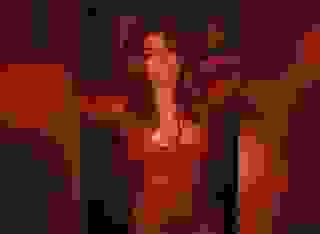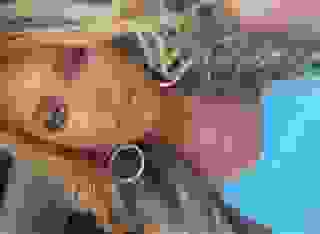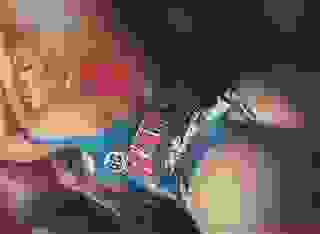Note: You can change font size, font face, and turn on dark mode by clicking the "A" icon tab in the Story Info Box.
You can temporarily switch back to a Classic Literotica® experience during our ongoing public Beta testing. Please consider leaving feedback on issues you experience or suggest improvements.
Click here"TheDestiny," confirmed Bancroft. "That would be . . . Commander Abigail Wainwright."
"The driver said she was quiet along the ride and she just turned right around. Something was bothering her, he said, but we don't know what."
Bancroft rubbed his chin as he listened. "Interesting indeed," he replied finally. It would seem his plan of keeping a driver on his payroll near the docks had worked flawlessly. He had a feeling Jack might look to leave his ship, and when that was the case, he wanted some intel on his comings and goings. While he was still in Java, Bancroft wanted to make sure he knew all about the man's whereabouts and what he was up to so nothing caught him by surprise.
"Did the driver say what they talked about in the cab?"
The spy nodded. "Nothing substantial it would appear. They saved that for once they were alone I'm guessing. All that he reported was basic chatter between two of the women—the sister and the Fourthie.
"Jack said nothing then?"
"Very little, sir. Mostly just remarking on their conversation," said the spy.
"And what happened once they reached the park? They were there for a long time by the sounds of it. What did they talk about?"
The spy gave him an embarrassed look. "Unfortunately, my man there wasn't able to get too close to listen to the conversation. He said there weren't that many people there, and it would have given away his position to tail them. At one point though, the sister started to cry several times there. At that point, he caught mention of something said about their parents but couldn't hear anything else."
"Fool," remarked Bancroft. "Am I not paying you enough to put the best men available out there? There's no reason why I shouldn't have the exact details of that conversation right now."
The spy jumped back slightly. "I'm sorry, sir. The conditions were bad and there just wasn't that many people—"
"You said that already," snapped Bancroft. "But any halfway decent spy would have found another angle to work with. If you hope to continue to secure payment from me, make sure you use competent people or I will find someone else to use."
"Yes, sir," squeaked the man, his voice cracking as a bead of sweat materialized on his forehead.
"Dismissed. Get out of here," said Bancroft. "And let me know if they leave again. I want details this time!"
The man couldn't have left any faster if his ass had been on fire. When the door to his office closed with a slam, Bancroft leaned back in his chair and brought his fingers to his eyes.It's so hard to find competent help, he mused.
When he removed his fingers, he stared up at the ceiling for several minutes. He could only imagine the conversation Jack had with his sister, something that he had no more of a lead on than a random spectator just walking by. He could only imagine what they were discussing about their parents, but it was enough to bring her to tears.
Could it be that he'd told her the fantasy scenario that the Fourthie woman told them the other day? Could he be deluded enough to believe it to be true? Was his sister the only sane one, something that might have caused her tears in the face of a brother losing his grip on reality?
All of it was speculation and therefore unhelpful. He'd just have to wait until another report came in, hopefully given by someone with a bit more intelligence between their ears.
*****
What a difference six weeks made.
Six weeks ago, the victorious allied army that was poised to liberate the occupied city of Zarah received its first bloody nose in the history of its formation. From there, the blows kept coming. It was chased back to Burwick after that first week, the Swabian armored vehicles showing their true value on the field of battle. Unlike the Swabians, only a small portion of Picards became trapped in the city for the second Battle of Burwick, although this one was a devastating loss compared to the victory of the first.
The allied army pulled back even further. There was no other place to go besides the capital of Daban, and General Neil Fagan coordinated that orderly retreat as best he could. Yet the army was in disarray. Defeatism was rampant, especially amongst the Picards. Whole units deserted the flag, melting into the countryside to escape the Swabian armored threat, which Neil had long since learned were called tanks by the enemy.
Embarrassingly enough, the other members of his army—the Javan marines and the Carinthian regiments—remained orderly in their retreat, making careful movements on the way back to the capital city. That didn't mean they weren't without loss, but none of their units broke, ran, or fled from the field of battle along the way.
Even still, there was little they could do to defend against a weapon that no one could stop. All conventional methods failed against the tank, putting their own engineers to hard work to figure out a weakness. So far the best defect it had was mechanical failure, with each of those tanks having a short life in the field before they would need an individual component replaced.
That was when they received their last big break. Just a short distance outside the city of Daban, the remains of the allied army were caught in a pincer movement between two separate Swabian forces. Total defeat was imminent, except for the fact that their only remaining tanks soon bogged down in the mud, able to go no further.
It was the window of opportunity they needed. The allied army extracted itself from its position and fell back on the city, assuming its last defensive position outside the suburbs as winter descended on them in full force. Soon enough, there was a state of near permanent freezing temperatures on the ground as the defenders sought to make their last stand before the capital.
Luckily for them, not only were the enemy tanks in poor shape, but their soldiers were just as exhausted from the pursuit over the length of the country. They'd taken a good percentage of casualties too (although not as high as the allied army), and many of them didn't have proper winter clothing. For that reason, a tenuous stalemate developed not far from the city limits. The allied army wasn't strong enough to push the Swabians away from the capital, but likewise, the Swabians weren't strong enough to take the city either.
That didn't mean that they weren't constantly repositioning themselves though, looking for an opening in the defense with which to strike.
It was for that very reason that Neil was at one of the observation points near the outskirts of the city that morning. It was snowing lightly, nothing new for this time of year, and his eyes were firmly trained on a low set of hills about several hundred yards out from their line.
"They've been doing that all morning, sir," said a nervous captain from his side. "They move up a little further and start digging in. Looks like they have a few trenches set up now in parallel lines, at least until the line breaks into that little set of woods right there. Then we can't really see what's going on."
"They're creeping steadily closer to the city, but just far enough that they are out of rifle range," said Neil. "And we don't have enough artillery to make them pay for getting too close."
The captain didn't say anything to that. He didn't have to. He knew, like all the other officers, that the bulk of their artillery had been left behind on the road back to Burwick. There just hadn't been the time to recover them before the advancing enemy army could overtake them, and thus they were abandoned. The pieces they were able to scavenge up along the way weren't the best quality or were outdated. The more modern pieces were limited in terms of ordnance too, leading to a drastic deficit in terms of firepower.
"What do you want us to do to them? I can have some snipers take position and make them pay every time they pop out of those trenches?" asked the captain.
"Not a bad idea," said Neil before he gestured out to the first trench. "Just keep an eye on it and let headquarters know if they start massing at any one point."
Neil didn't wait for a response before he was already moving. He left the observation post and made his way to another part of the city, close to one of the docks on the southern side. Here, another observation post had been put into an abandoned house that had never been reclaimed from the first Battle of Daban. It anchored the head of the street, only about fifty feet from the water, and it served as the extreme left of the allied line.
Neil found a lieutenant and a sergeant at the post, both of them looking out to the Swabians a few hundred yards away. Both of them saluted crisply.
"What's happening over here?" asked Neil. "Anything to report?"
The lieutenant answered as professional as he could manage. "Negative, sir. Nothing to report. All quiet on this sector and we haven't seen them move in hours."
The sergeant wasn't nearly as elegant. "They haven't even been up to shit, sir. I think they're afraid of a little action."
Neil cracked a smile. "With any luck, we can hope they are. Any sign of those tanks?"
Both men shook their heads. "Negative, sir," replied the lieutenant. "I haven't seen one since we settled into the city."
"Perhaps they're all out?" suggested the sergeant. "We know how easily they break down. Maybe they all need to be in the shop right now?"
"Again we can hope," said Neil. "Keep us informed and let us know if you see any movement."
Neil spent the rest of his morning doing the same thing along the front lines of the army. Luckily for all of them, the Swabians appeared to be settling in, not offering any attempts for battle. Despite the first section he'd visited where they were moving the lines forward, the rest of the Swabian line didn't look like it wanted to fight.
Around the middle of the day, Neil made his way back to the palace, now the nerve center of the army just like it had been months ago when they kicked the Swabians out of the city the first time around.
He was searching for the king, finding the man in the main strategy room overlooking a giant map of the city. It had been marked with the rough positions of both armies, and at this moment, King Aedan was looking at it with a frustrated look on his face.
"Your Majesty," greeted Neil as he approached the man's desk. "You look like how I feel right now." Neil meant the gesture in jest, knowing that the king preferred a degree of camaraderie with his commanders but Aedan's expression didn't change. Instead, he waved around a dispatch.
"Our combined naval fleets have been defeated by the Swabians," the sovereign said quickly before his hand went to his cheek in despair.
Neil paled in response. The naval force that was out on patrol of Picard territorial waters was a combined effort, a union of both Picard and Carinthian forces. It had been commanded by Admiral McNally on the Picard side and Admiral Romero on the Carinthian. Even though it was presumed to be outnumbered by the Swabian forces, the ships within the task force were some of the most modern to be found anywhere.
A defeat on their part would be troubling indeed for their future prospects.
"How bad was it? What are the casualties?" asked Neil.
"A few sunken cruisers," replied the king with an air of desperation. "Enough to push them back. They're on their way back to Daban now."
"They didn't get any of the battleships though," said Neil, finding the only silver lining he could. "At least their power isn't broken."
Aedan shrugged. "We are being pushed back everywhere. On land and on sea. How long until Swabian aircraft appear in the skies? How has it come to this, Neil? Everything was going so well two months ago."
Neil knew exactly how it had come to this, and it had to do with everything going so well around the time they recaptured Burwick. The Picard soldiers, not used to combat or rigorous discipline, assumed the enemy was beaten and slackened in their duties as a whole. It was an overconfident and underprepared army that was confronted by superior forces at the Battle of the Tanks, starting their long retreat that brought them back to the capital.
Neil scarcely had to mention that to Aedan. The sovereign already knew of their woes with that particular issue. The only decent thing to come out of that admission was that the worst offenders—those that eschewed the training or tended to forget they were soldiers, were already dead. Those that remained were often the ones that followed orders, and therefore, they were able to escape the casualty rolls.
It also helped them that the humiliation of having to retreat all the way back to the capital helped to show them that they weren't the super-soldiers they thought they were. Many of them found their humility on the way back and they hadn't surrendered it since.
"How was your tour of the front lines?" asked Aedan after a few moments of silence. "Anything to report out there?"
"It's quiet except for one sector," said Neil, giving him the details of the Swabian advancement toward the city. "We're not exactly sure what they're up to yet, but my guess is they are trying to shorten the distance between them and us for the inevitable attack."
"I take it the men are making them pay every time someone keeps their head up for too long?" asked the king.
Neil nodded quickly. "Most certainly."
"Good. I'm going to raise the bounty on dead Swabians," said Aedan with a steely grit. "Two silver pieces for every dead one."
"How do you want to verify?" asked Neil.
Aedan shrugged. "Ears. Hands. I'm not picky, but pick one and stick with it."
Neil smiled grimly. "I'll get it done."
"Good, now there's one more thing we need to talk about," said Aedan as he stood up and walked around his desk. He leaned against the front of it and crossed his arms. "It's about Tavish."
Neil growled out of instinct. Colonel Tavish had been a thorn in his side ever since Neil took command of the army. At first, it was the subtle patronizing that bothered him—the treatment caused because Tavish believed he should have been the one in high command. Then it was the snubbing—the ignoring of orders and the lack of discipline, which had the effect of causing the army's first defeat against the Swabians.
Nothing had gotten better on the retreat as Tavish's behavior became blatantly subordinate. It hadn't been met with silence, yet no matter what Neil countered with, Tavish seemed to be undaunted, defiant to the end.
"What about him," asked Neil, his expression darkening.
"Tavish came to see me this morning," said Aedan, wearing an unreadable expression. "He asked that I transfer command of the army to him. He would like to be the commander in your stead."
Neil saw red. In an instant, his face became splotchy in anger and his nostrils flared. He felt his own wrath building internally, a roaring fire that threatened to spill out in front of his king.
"That son of a . . . How dare he," fumed Neil as he began to pace around the room.
"He told me that you didn't have enough experience to be the head of the army," said Aedan. "In a way, he's right. He does have more experience than you, being a senior officer for longer." Aedan took a deep breath and steeled himself. "So what do you have to say?"
"I say I'm about to wring his disobedient neck," said Neil. "You can say what you want about his time in service, but this ismy army. I will get it back to its laurels soon enough, but I won't tolerate an officer going behind my back for my job."
"So you still want the head job?" asked Aedan. "You still want to be my commander?"
"Absolutely," said Neil firmly.
Aedan let out a relieved sigh as a small smile filled his face. He walked closer to Neil and put his hands on his shoulders. "That's what I needed to hear you say. I know you're the man to command this army. I also know that Tavish isn't as good of a commander as he thinks he is. There's a reason why I chose you to lead above all others. Remember that, Neil."
"And Tavish?" asked Neil, the fire still in his belly at hearing the very name.
Aedan shrugged. "Deal with it as a true commander would. I'll leave it to your discretion. This is your army, Neil. Get ahold of it."
Neil nodded, already knowing what he was going to do to the backstabbing officer.
He almost pitied him.
Almost.
*****
"Are you sure it's still operable?" asked Magda as she walked quickly alongside the Swabian captain. "Who's to say it wasn't damaged when the building fell?"
"I believe that's what the Picards thought when the building took an indirect hit. You can even see where the artillery shell fell not far from the wall. That roof caved in from there, and I'm sure they thought that anything left inside wouldn't survive," replied the captain, leading her to the abandoned site, discovered after their last battle.
That last battle had been particularly troubling for Magda. They'd been so close to destroying the allied army between two pincers, and if the tanks hadn't become stuck in the mud, they would be spending the night in Daban instead. She'd been hoping for a quick victory, knowing the shock value of the tanks, but instead they were seemingly in for a long siege of the city.
That is, unless they could unearth what was under this building.
"You can see here that the front side was open," said the captain as he gestured at the ruins. There were about twenty Swabians hovering around the wreckage of the building, many of them gathered near the center where they were trying to pull off part of the roof to expose what was underneath. "We believe that's how they got them in and out."
"I don't need those kind of details, Captain," snapped Magda as they got closer. "I just need to know if it's operable."
The captain cleared his throat and stopped talking long enough for them to reach the work detail. It was then that Magda snapped her fingers. "Go on, help them. Get it uncovered."
He hurried along when she gave the command, adding his manpower to the others as they attempted to lift the single piece of roof as one. Magda could just barely make out what was underneath, only seeing some wheels and a broken material that looked like wood covered in some type of film. It was only once the entire workforce got the ruined roof removed that Magda was able to truly appreciate what was underneath.
Despite not taking the brunt of the damage from the collapse of the roof, the object underneath wasn't in good shape. Even still, it was the first time that Magda had seen one this close, usually seeing them flying in the air above them.
The airplane's upper wings were broken, snapped in two places from the falling debris and then crushed under the weight of the roof. The piece of wood that stuck up above the tail was crushed too and would need replaced. Similarly, the propeller was cracked, but if one considered all the damage, there didn't appear to be anything that wasn't fixable.
"So we meet at least," whispered Magda as she ran her hand over the smooth material covering along the wood. "An enemy airplane."
She knew what they were called, of course. She'd learned a great deal from captive allied soldiers, many of whom held the invention with a lot of pride. She'd even found one particularly intelligent man who described how it worked to her in great detail. His knowledge ensured he escaped death, becoming useful to her own team of engineers in preparation for this day.
Once the airplane was uncovered, the recovery team soon descended on it, making observations, clearing away any remaining debris, and checking out the engine and the cockpit for any more hidden damage. The biggest potential issue they could run into was whether the engine was too damaged to be fixable, but Magda didn't consider that to be the worst outcome. Surely the country that created the tanks could figure out an appropriate engine to achieve flight, right? All they needed was a working design.








